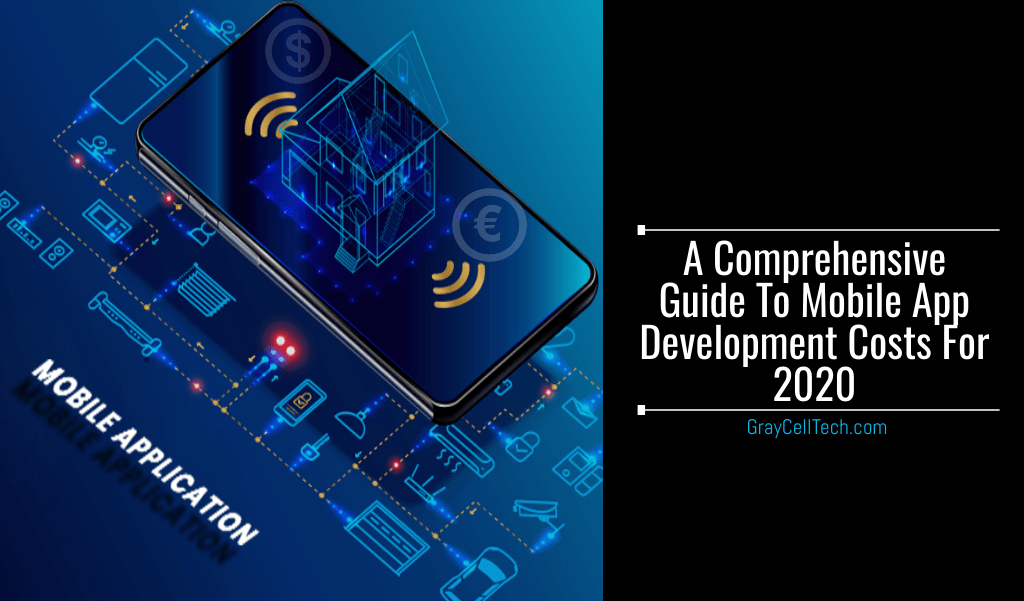Mobile phones are the biggest source of entertainment for modern-day consumers. At present, people spend maximum time on their mobile phones for various personal as well as professional reasons. Mobile phones have influenced how people interact among themselves or businesses.
According to Statista, more than 3 billion people are using smartphones across the world in 2020 and this number is expected to increase by the next few years. Therefore, businesses must invest in mobile app solutions.
Businesses are finding innovative ways to earn more money and developing a mobile app is a new revenue stream worth considering. Now, the question is: What does the mobile app development cost?
Well, numerous factors contribute to the cost of mobile app development. In this blog post, we have provided detailed information about the mobile app development cost.
Factors Affecting Mobile App Development Cost
- Target Audience
- Type of App
- Platform
- Feature Set (paid/free)
- Design and development complexity and creativity
- Server setup and maintenance costs
- App Maintenance
Some more factors, such as the development process, hiring developers or app development team, and time for app development, play a key role in mobile app development.
Let’s dig down to the factors that affect the cost of mobile app development.
Target Audience
 As a first step of the mobile development process, businesses are required to identify their target audience, focus on them, and keep them on top. However, companies tend to forget their main goal while developing their mobile app and get diverted over several other things that can make the business successful in the market. For instance, they focus on quantity over quality, but it is recommended to maintain a perfect balance between quality and quantity.
As a first step of the mobile development process, businesses are required to identify their target audience, focus on them, and keep them on top. However, companies tend to forget their main goal while developing their mobile app and get diverted over several other things that can make the business successful in the market. For instance, they focus on quantity over quality, but it is recommended to maintain a perfect balance between quality and quantity.
Type of Mobile App
Mobile apps use various programming languages and frameworks and categorize as:
Native Apps
Such Apps are created for a specific platform – iOS or Android. These apps use languages that are supported by these operating systems. Moreover, these platforms completely support development tools. For example, Objective-C and Xcode are used by iOS, while Java and Eclipse are used by Android. Although these apps are the most complex and expensive, they result in a high level of performance.
Web Apps
Web app is a mobile version of a website that utilizes responsive design to ensure a smooth user interface across varied screen sizes (such as tablets and smartphones). It has limited features and lower performance in comparison to native apps.
Hybrid Apps
These apps are a combination of web and native technologies and cater to the large audience. Such apps have low development and maintenance costs as compared to other apps. However, they have limited access to smartphone hardware in comparison to native apps.
Hybrid apps can run smoothly on all OS, such as iOS, Android, and Windows.
Platform – iOS or Android?

Certain apps are made accessible on different platforms such as iOS, Android, and Windows devices and the internet. Each platform has a different impact on the app development cost.
iOS and Android are different from each other. They have entirely unique interfaces. Apps developed on these operating system platforms will include a separate set of processes. It may be challenging to select between iOS and Android; however, if your budget allows you to opt for both platforms, you must give it a chance.
iOS Apps
Pros
- Fast to build
- Less costly in comparison to Android apps
- Stick to the same OS and upgrade integrated.
- Better performance in comparison to Android devices. Ensures quality.
- More engaging. Easier to use.
Cons
- The hosting cost is more on the Apple store.
- Slower app development process due to strict guidelines.
- Fewer iOS users in India.
Android Apps
Pros
- More number of users in India
- The cost of downloads on Android is comparatively low.
- Regular update is not required, thus, maintenance cost reduces.
- Hosting and maintenance cost of an Android app is less than that of an iOS app.
Cons
- Takes more time to develop
- Paid apps may not perform very well
- Requires proper maintenance as it has a wide variety of devices in different sizes, screen resolutions, and performance.
Paid, Free, or E-commerce App?
E-commerce Apps
These apps are revenue-based models for selling products from sellers that are listed on the app.
Paid Apps
These apps generate revenue from app downloads. In this case, mobile app development depends on the number of apps downloaded.
The paid amount is based on the expense capacity of the target audience. You can view several paid Android apps on the play store.
Free Apps
These apps follow a different revenue generation module. They expand existing customers and attract new customers. Free apps generate revenue from advertising and affiliate marketing and build a trustworthy relationship between a company and its customers.
Mobile App Functionalities
- List App
It is a mobile-optimized version of a website that is easy to create and does not incur any major cost.
- Static App
It is a simple app with functions that do not require an internet connection such as a calculator that has a limited set of features.
- Dynamic App
It requires some sort of WiFi connection or internet server connectivity to function.
- Gaming App
It is complex and the most expensive app as it contains complex AI.
UX/UI Designs

UX/UI design of a mobile app creates an impression on users. A well-designed app enhances the look of the app and also enhances the user experience. So, to get noticed your app design must be innovative with emerging technology, easy to navigate, purposeful, aesthetically brilliant, robust, long-lasting, and consistent among all devices and platforms.
Calculation of Mobile App Development Cost
Consider the given formula to quickly evaluate your mobile app development cost:
App Development Cost = Total App Development Hours * Hourly Rate
The cost of app development varies with each mobile app development company. The amount generally ranges from $10,000 to $250,000 based on the app complexity, functionality, type, marketing as well as the mobile app development company that handles the project.
Note: The cost does not determine the quality of the app, i.e., a high price does not mean better quality. Therefore, expensive is not always better.
Cost of Mobile App Development in India
In India, the app development cost is largely dependent on the complexity of the app. A basic app that does not include API functionality, back-end database, or social media integration can cost around 10-15K INR, a moderately complicated app can cost around 10-40K INR, and a complex app can cost at least 35K INR.
With the change in technology, new updates are required in order to make the app frictionless. Therefore, nearly 20% of the total mobile app development cost is required to spend on refining the app by enhancing its existing features.
Final Thought
Every business must need a good app that can act as the face of the business. Using apps, users can interact with a company and its services. While app development, developers must ensure to provide an immense and friendly experience to the target users.
Talking about the app development cost, it varies from app to app and company to company. In case you want to develop an application for your business and are not sure how to do it, then hire the right mobile app development company. Not sure which company to hire? Don’t Worry!! Hire remote developers from GrayCell Technologies – an Indian software development company that addresses your business requirements and accordingly offers a top-notch quality solution for your project requirements at a low development cost








